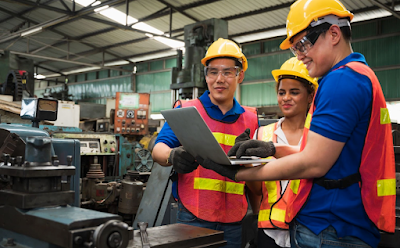Factory Worker Jobs In Japan
Factory Worker Jobs in Japan
Factory Worker Jobs In Japan If you're considering a
factory worker job in Japan, there are several steps that you should follow.
This article will cover the average salary for factory workers, how to apply
for a job in Japan, and the duties of a factory worker. You can also learn about
the job application process for people who don't have a sponsor. The article
will also cover the duties of factory workers and what they should expect in
their daily work.
Average salary for factory workers in Japan:
There are a number of
factors that determine the average salary for factory workers in Japan.
Experience level and age are important considerations. Those entering the
workforce in their 20s and early thirties receive the lowest salary. As a
result, salaries gradually climb until they reach a peak in their mid-late
fifties. As the average age for retirement in Japan approaches sixty, salaries
begin to decline again. Although many Japanese companies do mandate retirement,
this doesn't mean that you won't be paid a decent amount.
While there are several
factors to consider when evaluating the average salary of factory workers in
Japan, a good starting point is to consider the number of people working in the
field. According to statistics published by the government, ten people make
about four million yen each year. The average age for workers is six years old,
with the gender pay gap weighing two to one. A bonus ranging from one to three
times the average salary is not uncommon.
Foreign nationals working
in specialized industries earn approximately three hundred and twenty-four
thousand yen per month. This is the same as the national average for women. And
these foreign workers have been working in the country for 2.7 years, on
average. This means that they are likely to receive more generous compensation
than Japanese workers. According to statistics from the Ministry of Health,
Labor and Welfare, a woman's salary is equivalent to a man's at the same level.
If you're looking for a
career that doesn't require physical labor, consider working in the information
technology industry. As the highest paying industry in Japan, the IT industry
is also one of the best places for foreigners to work. It pays 487,441 yen a
year, and there are plenty of foreign workers in the field. Furthermore,
Japanese Language proficiency is not required. The IT industry also tends to
have more foreign workers than any other sector.
A factory worker's salary
depends on the type of job, their skills, and their work experience. Factory
workers in Japan earn a salary that varies from one place to another and is
dependent on the level of their experience, skills, and the type of visa they
hold. In general, factory jobs are full-time and require an eight-hour shift
over five or six days. There are also many opportunities for overtime if you
are an experienced factory worker.
Job opportunities for factory workers in Japan without a sponsor:
If you want to work in a
factory in Japan but do not have a sponsor, you can apply for a job in Japan
without a sponsor. Most factory jobs do not require work experience, but you
must have self-related skills and be able to attend basic meetings. However, if
you want to work in a factory in Japan, you must know that you will have to
work hard and dedicate yourself to your job.
There are many food processing
factories in Japan that accept foreign workers. Most of these factories are
looking for factory workers who can operate machines and process products.
Their salaries vary depending on their skills and experience. They also differ
depending on their skills, prefecture, and visa type. Generally, factory
workers work full-time shifts for five to six days. Depending on their skills,
they can expect a high salary.
While visa sponsorship
has been common in the past, immigration bureau upgrades have changed that.
Many employers offering visa sponsorship are now only accepting applications
from people inside the country. Job hunting can take a long time. Besides, you
cannot get a phone number or bank account until you have a long-term resident
status in Japan. Also, it is difficult to get a job without a stable internet
connection.
The Japanese government
has recently made some changes to its immigration and visa policies, and the
number of foreign workers working in Japan has reached a record high. The majority
of these foreign workers are transferees from multinational companies with
operations in Japan. Nonetheless, these changes do not mean that foreign
workers will not find employment in Japan. The Japanese government is trying to
improve the working environment in order to create a better work-life balance
for its citizens.
If you are interested in
working in a factory in Japan without a sponsor, there are some ways to find a
job. If you are not looking for a permanent position, you can try applying for
a temporary work visa or even a one-year working holiday visa. However, this
visa type is difficult to get and takes a lot of bureaucratic paper work.
Nonetheless, the benefits are worth it.
Application process for factory worker jobs in Japan:
Many successful Japanese
electronics companies maintain long-standing relations with school personnel.
Generally, the application process for factory worker jobs in Japan requires an
interview, physical dexterity test, and a written test. Less than half of
applicants are selected for production positions. However, there are many ways
to overcome the application process. These tips will help you make it through
the initial step and eventually land yourself a production job.
The application process
for factory worker jobs in Japan is not set in stone. Each applicant will have
a different experience depending on the agency, the potential employer, and
their own luck. In general, there is a five-day processing time. Depending on
the branch office and agency, you should expect this to take five to ten days.
Once your application is approved, you can work in a Japanese factory. Be sure
to meet the qualifications of the job, and don't try to rush the process.
Factory worker jobs in
Japan are plentiful. The country has 191,000 factories, employing many people
and contributing to the nation's economy. However, there are strict
requirements for foreign workers. Generally, foreign workers need to pass the
country's immigration requirements before being hired. However, there are some legit
agencies that can help you find a job in Japan. Some factories also hire
working-students. Listed below are some tips for applying for factory worker
jobs in Japan.
Foreign students studying
in Japan can apply for part-time factory worker jobs in Japan. Part-time
factory worker jobs in Japan usually require less qualification and require
only a basic level of Japanese language proficiency. The hours of work in these
jobs are relatively short, averaging twenty-eight to forty-hour week. This is a
great opportunity for students, since the salary will be higher than in the
Philippines. The application process for factory worker jobs in Japan may take
a year to complete.
There are many
food-processing companies that accept foreign workers. Factory workers perform
a variety of tasks including packaging, operating machines, and monitoring
compliance standards. Factory worker salaries vary widely depending on
experience, skills, visa type, and prefecture. Generally, it takes about one
year of experience to secure a job. Moreover, the salary is usually more than
US$10,000. You can even find factory worker jobs in the Philippines as an OFW.
Duties of a factory worker in Japan:
As a factory worker in
Japan, you will process products, operate machines, and check for compliance to
quality and safety standards. The salaries for factory workers are highly
variable, depending on the prefecture, visa type, and experience. Full-time
factory jobs are 8-hour shifts, five to six days a week. For foreigners,
factory jobs can be a great way to support themselves while studying and
working in Japan.
While there are many
benefits associated with factory work in Japan, it is important to be aware of
the long hours and high pay. For this reason, applicants must have a strong
sense of determination and be enthusiastic about their new job. In addition to
the high salaries, factory work in Japan can be challenging and highly
rewarding. Although it may require long hours and long days, working in a
factory is a rewarding and challenging experience.
Many Filipinos dream of
working in a Japanese factory. The country has over 190,000 factories and many
different industries. The Japanese are particularly proud of their products,
and are highly competitive in the global marketplace. It's no surprise that
many of us would like to work in Japan's factories, since the salaries are so
high! A factory worker's income can help support a family back home. In Japan,
factory workers are also able to enjoy higher quality lives than we do in the
Philippines.
The Japanese factory is a
place for people with good living conditions, but many workers have had bad
experiences. Factory workers in Japan need to learn time management and work in
ways that don't harm them. Fortunately, there are many factory jobs in the
country, and there's more than enough to go around. If you're interested in
getting a job in the country, you can start by applying. After all, the
Japanese government is more than willing to hire foreigners, and factory
workers in Japan often have the best conditions.
The Japanese culture also
promotes the idea of lifetime employment. Lifetime employment in a factory
requires that a factory maintains a high level of work force to meet the
demand. This means that Japanese workers will often work 60 hours a month on
average, even three hours a day during periods of high demand. They will also
work overtime, but only as much as necessary. Despite this, they are still
willing to work as much as they could.






0 Comments